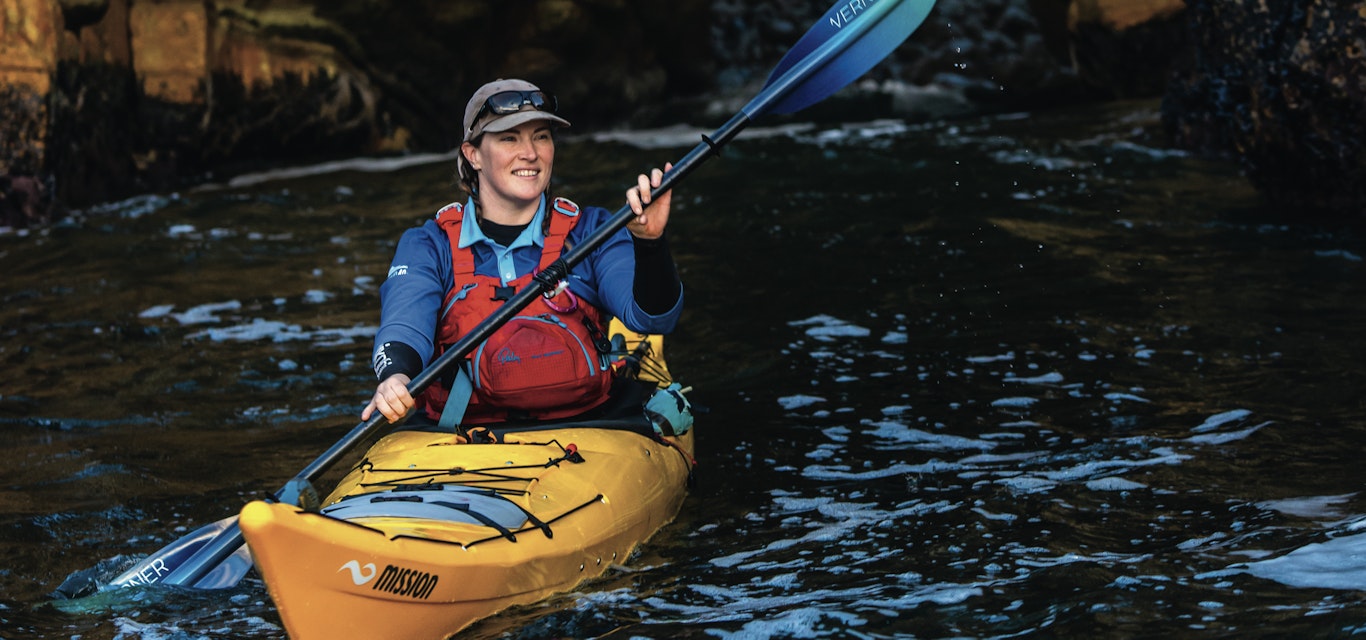A mile in the shoes of an adventure seeker
Looking for an excuse to wander national parks and paddle around all day, Tory Stewart decided to dip her toes in tour guiding and has never looked back.
Tory Stewart has never been about the nine-to-five. “I’ve found every reason to be outside and interacting with people. I followed the things that inspired me and made me want to get up and get out there. Then I was, like, I can figure this out. I’ll make a career somehow.” A Queensland kid, Tory was always in the ocean. “I was a fish and very confident. I’d know where the rips were and get into them deliberately and go out to the shark nets. I loved it.”
After leaving school she trained in Aotearoa/New Zealand as a ski instructor and carried those skills to Japan and on to Canada where she learnt snow safety, worked as trail crew and guided horse pack trips. Yet Tory always felt strange living in the mountains.
Here she enrolled in an outdoor leadership course at TasTAFE which turned out to be “an excuse to travel around all the national parks and learn from some of the best in the industry”.
Students had the option of mountain biking or sea kayaking. “I’m an ocean lover and a water baby so I immediately went to sea kayaking. As soon as I started I just fell in love with it.” That led to some whitewater rafting.
Tory’s first guiding season in Lutruwita/Tasmania was bushwalking and paddling on Maria Island and at Freycinet. Doing a Cert IV in Outdoor Recreation and in Tourism (Guiding) got her into sports like climbing and mountain biking.
‘I’ve had trips where I’ve ‘carried’ a person in the front of a heavily laden double kayak’
In 2013 Tory began guiding with Roaring 40s Kayaking, which operates sustainable trips in Southwest National Park – a UNESCO World Heritage area – and off Flinders Island. With a “lead from the back” approach, Tory guides expeditions and outdoor education groups, and trains staff. Just before COVID hit, she guided in Antarctica for two months.
“Paddling is a very particular type of fitness. It’s repetitive and good technique helps.” To be able to respond to emergencies, she says, guides must maintain above-average physical fitness.
“I’ve had trips where I’ve ‘carried’ a person in the front of a heavily laden double kayak.” Tory knew that person might not be able to do more than an hour of paddling a day and, although that was a unique situation, she wants to always be able to adapt for guests.
“I think if you’re not a people person you shouldn’t really be doing the guiding thing. You can be an excellent outdoors person, and there are people who are way better sea kayakers than me, but that isn’t what we’re doing.”
Most motivating for Tory is being in a position to facilitate unforgettable experiences in nature. “Sitting in three metres of swell folding under your boat, feeling the power of the ocean, can be intimidating for guests.” Typical Roaring 40s feedback is that people felt safe despite being outside their comfort zone. She also loves sharing her ever-increasing understanding of marine environments, swell profiles and intertidal zones.
Although guiding is “an amazing lifestyle choice”, burnout is common. “I find ways to relate to every single person. When you can do that you have far more empathy around what that person’s going through and their perspective on the situation.”
Tory also goes on solo trips to reset. Her relationship with the ocean has changed dramatically. “I’ve got a newfound respect for Tasmanian water and the Southern Ocean particularly. I’ve always enjoyed that challenge of stepping into something very uncomfortable. But now the South West feels like a second home.” Tory Stewart tries to align her lifestyle and values – one of the reasons she, and partner Luuk Veltkamp, recently bought Roaring 40s Kayaking. They plan to make their own impact on the industry. “One of the most sustainable tourism products is being in a kayak but we’ve got a large responsibility where we go.”
“I’ve been constantly inspired and in awe of people who operate down here in Tassie. For me, now on the cusp on doing it myself, is a little bit of a dream.”
